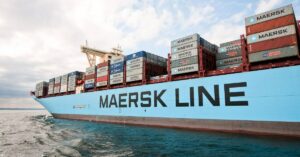
Ukraine Damages 2 Ferries In Russian-Occupied Crimea, Disrupting Moscow’s Operations
June 3, 2024
Former U.S. Navy Admiral & 2 Business Executives Arrested For Bribery
June 4, 2024

Danish shipping and logistics company Maersk experiences significant terminal congestion in Asian and Mediterranean ports, which causes substantial delays in its vessel schedule.
Due to congestion, the world’s second-largest container shipping company will have to cancel two westbound sailings from China and South Korea scheduled to depart in early July.
Maersk’s notice comes as worldwide supply chains are experiencing cascading delays and increased expenses due to Iranian-backed Houthi rebels strikes on commercial vessels near the Suez Canal.
Major shipping firms, including Hapag-Lloyd, Maersk, and MSC, have diverted ships to a longer, safer route around Africa.
According to Linerlytica, Singapore, which has the world’s second-largest container terminal, is the latest to experience congestion.
Additionally, data from the company indicated port congestion in China, Dubai, Spain, and the U.S.
High winds and unexpected weather have disrupted cargo shipments at Chinese ports, shipping experts told Reuters.
According to Linerlytica, the rising congestion at Singapore and Dubai’s Jebel Ali ports is due to a sudden rise in cargo demand and ongoing interruptions caused by ship diversions from the Red Sea.
According to pricing platform Xeneta, ultra-large ships from the Far East are offloading containers at western Mediterranean ports such as Barcelona before reloading on smaller ships bound for final destinations in central and eastern Mediterranean ports, burdening operations at affected ports.
According to the Journal of Commerce, backups are also growing at two United States East Coast ports.
Congestion in Charleston, South Carolina, is caused by an ongoing infrastructure project, while difficulties in Savannah, Georgia, result from a recent software glitch, according to the trade newspaper.
Reference: Reuters
Maersk Faces Acute Port Congestion In The Mediterranean & Asia Causing Vessel Delays appeared first on Marine Insight – The Maritime Industry Guide
Source: Maritime Shipping News


